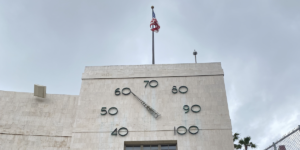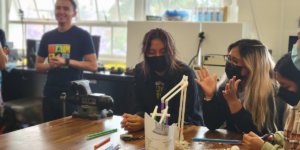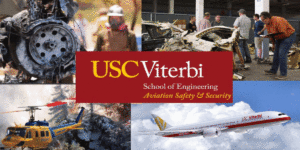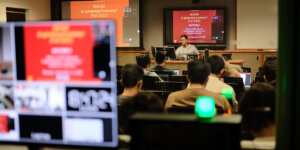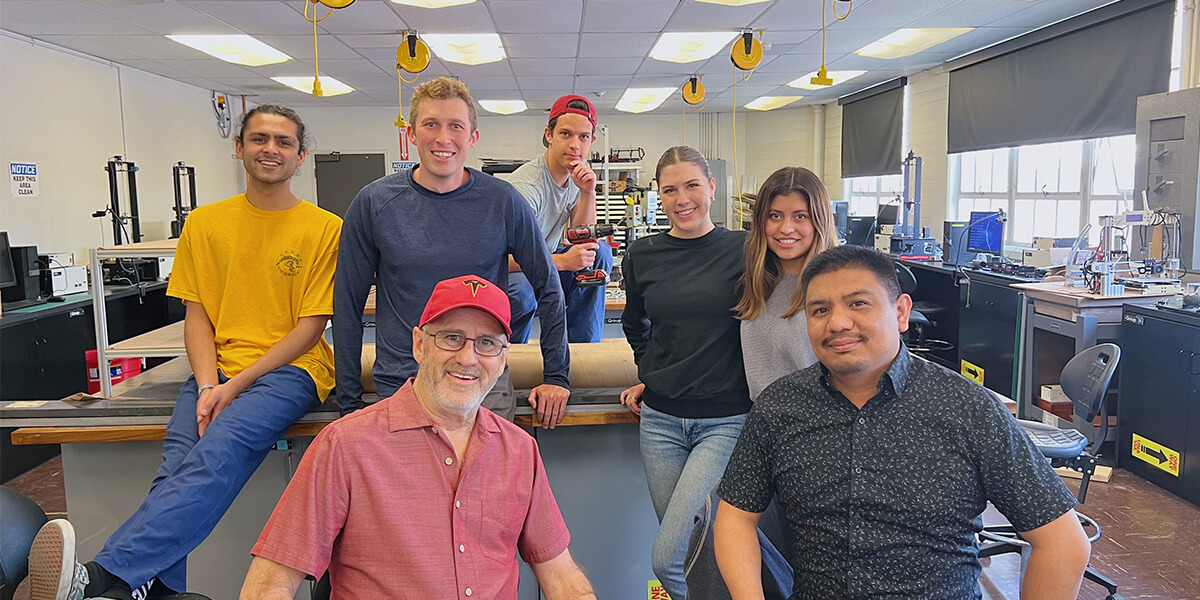
Rod Yates and Jeffrey Vargas with their team of student workers at the AME instructional labs
When Rod Yates joined the AME instructional labs as a technician in 2010, he was given a task that has proved transformative for the labs, for generations of graduates, and ultimately for Yates himself.
The task was to establish a rigorous safety program to radically reduce any chance of injury while operating equipment. That might sound simple enough. However, Yates took on the challenge in a manner that proved far more than a series of rules and regulations.
“I’m a machinist and a tool maker by trade, and my formal education ended with my high school diploma,” he explained. “But I arrived at USC with 30 years of experience in manufacturing, where safety was instilled into my training and my daily routines. I brought a new perspective to the team.”
In the labs, Yates teaches students how to safely operate saws, lathes, laser cutters, CNC mills, 3D printers and other equipment – all potentially high-risk activities if operated incorrectly. His role soon extended beyond supervision and became a type of consultation – helping students to understand how their designs could be manufactured, scaling down as necessary and allowing big ideas to find their feasible form.
Yates works along Jeffrey Vargas, who manages the electronics side of the lab. It’s no exaggeration to claim that Yates and Vargas have gained legendary status at AME – together, they radiate generosity in sharing their knowledge and bringing the best out of their students.
“I’ve gained a vast amount of technical know-how with respect to manufacturing and electronics,” said Jaiden Bhatia, one of Yates’ dedicated student workers – fondly known as the “lab rats.” Bhatia’s job is to assist in both sides of the lab, walking the floor and responding to students’ questions as they conduct their experiments.
“Those questions could involve malfunctioning equipment, justification behind the circuit design, performance of specific hardware, software algorithms and more. This means I need a comprehensive understanding of each system to adequately assist each student. Other responsibilities include general lab organization, safety enforcement and equipment maintenance.”
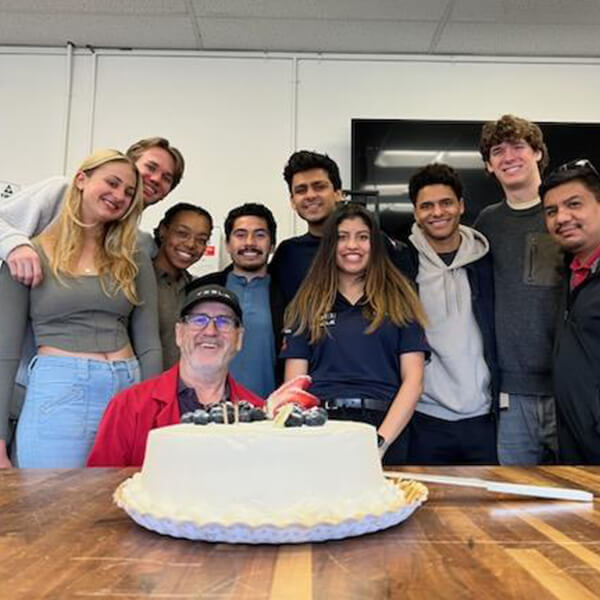
Jaiden Bhatia’s surprise birthday party at the AME instructional labs
That said, it’s not all hard work. Bhatia remembers a particularly difficult week when his birthday coincided with the stress of exam season.
“Rod and Jeffrey called me in to the labs and said there was a task that needed taking care of – it turns out all my coworkers and friends were there to throw me a birthday party!”
Over the years, Yates and Vargas’ guidance of the students has developed into a unique rapport and overall attitude of care. “I’ve seen some incredible projects come through these labs,” said Vargas, picking up a student’s prototype for a regenerable shoe, and indicating an experiment to test memory alloys for application in prosthetics. “Here, the students learn the skills they need to create their most ambitious senior projects, and they take that knowledge with them into their future careers.”
Since establishing the safety program, Yates has attended conferences for the national Student Shop Managers Consortium, gathering intel to inform best practices at the labs. The upheaval of the pandemic prompted members to rethink what in-person instruction might mean, expanding definitions of physical safety towards wider considerations of wellness.
“I’ve seen my students change in the last few years, especially in the ways they might keep quiet about what they’re worried about,” Yates revealed. “So, I take it upon myself to ask if they need help and support – and not only with their projects. I ask them how they’re feeling and how they’re doing in their classes. I ask – ‘can I make you smile?’”
As Yates sees it, there’s a clear throughline between a student’s mental state and their ability to operate dangerous machinery with presence of mind. Wellness feeds into safety, and vice versa. That’s the thinking behind the 2023 Student Shop Managers Conference, which will be hosted by AME on July 11-13.
Neatly named W.E.S.T. COAST (Wellness, Education, Safety, Teamwork), the conference aims to inform the key discussion points of safety, training, inclusion, technology, finances and equipment with a new appreciation of optimal learning environments. In addition to panel discussions and breakout groups, the conference will include a tour of the department’s recently renovated Fabulous Fluids Facility – another major facility for hands-on learning at AME.
All in all, the learning experience in the instructional labs is infused by Yates and Vargas’ own understanding of what it means to feel fulfilled. “I love my job,” said Yates. “Especially when students come back after graduating to tell us about the amazing things they’re doing. It gives us that sense of a full circle – how the support we provide impacts what’s happening in the wider world. That’s an amazing feeling.”
Published on June 27th, 2023
Last updated on June 27th, 2023




